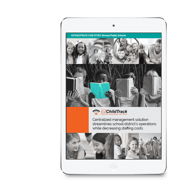
COVID-19 has caused widespread closures of many businesses, including childcare, summer camps, and afterschool care. Communicating with families is crucial for maintaining relationships and ensuring everyone is receiving accurate information about hours of operation, length of the closure, and how they can receive future communications.
Here are some ways to keep in touch and let parents, caregivers, and staff know how your business is handling an unexpected and potentially lengthy closure.
Where to Get Accurate Information
You and your clients can reach out to the CDC, either via the main web page or their COVID-19 information pages.
In addition to the federal government websites, your state is likely to release periodic press releases containing up to date news on how closures, lockdowns, and quarantines are being addressed. For example, the state of Michigan put out a press release on March 15, 2020, with information about communications between childcare providers and parents. The Hunt Institute is attempting to aggregate state closure information on their website.
Keep Communications Open
Make sure you have an open pipeline to parents. This might include:
- A parent portal
- Newsletters
- Website
- Social media
- US Postal service
If you use childcare management software, you may have the option to provide a parent portal so that all of your clients have secure access to information about their children and your business.
Keep up-to-date information at all communication outlets about your hours of operation, whether you are closed and when you intend to open, and what you are doing to keep your facility disinfected and operating.
If you must close, let parents know your plans and expectations about tuition and fees as soon as possible, including refunds or fee relief for those who have lost their jobs.
Let Parents Know How to Communicate With Their Children About COVID-19
Many parents are finding themselves either working from home or looking for work. They are now the primary daytime caretaker of their children. Your parent clients may need some assistance and reassurance about how to explain things to their little ones or even older children.
Here are some recommendations on what to advise:
- Stay calm
- Communicate at the level of the child
- Establish and maintain a regular daily routine
- Focus children’s attention on helping others
- Monitor screen time
- Provide tons of love and affection
Children pick up adult emotions easily. Let parents know that if they can remain calm, their children will feel better as well. It’s easy to panic at a time when there are so many unknowns, but adults are there to set the expectation of behavior.
Tell them to be role models. Describe ways to keep calm, such as deep breathing exercises they can show their children, and let the kids know it’s OK to feel unsettled, especially when it seems like things change every day.
Communicate clearly, accurately, and honestly about the pandemic and COVID-19 or “the rona," as many children have started calling it. Let the children’s questions guide you. You may be surprised at what concerns them. It may not match the parents’ preconceptions.
Help parents explain safety steps like social distancing, handwashing, disinfecting surfaces, and keeping hands away from faces.
Stay up to date on the facts with the CDC. If you notice changes, let parents know about it.
In general, be aware of how you and parents talk about COVID-19. Focus on the positives of spending family time together. Give parents ideas about age-appropriate projects and some fun things to do, like singing and going outdoors.
A daily routine will keep children calmer than if chaos reigns. Kids like to know what to expect every day. Have them go to bed and get up at the same time every day. Prepare healthy meals and snacks. Allow them time to occupy themselves. Parents don’t need to program every minute of the day.
It helps to focus on doing things for others. It can take everyone’s mind off the news and stressful feelings. Organize food for shut-ins. Make video calls or write letters (What a novelty!) to friends and relatives. Let families know there are things they can do to make a difference.
Don’t let the children spend too much time watching videos or playing on the computer. Especially take care when viewing news. Children pay more attention than we think to what is said.
Age Appropriate Communication
Parents may be unsure about how to talk about COVID-19 with their children. Here are some general guidelines:
- Early elementary - Keep explanations short and simple. Balance the facts with the reassurance that you are staying healthy and will be there to take care of them.
- Upper elementary and early middle school - At this age, children are more vocal about their concerns. They may need help separating facts from rumor or fantasy. Discuss the national, state, and local efforts for keeping community spread to a minimum.
- Upper middle school and high school - Issues can be discussed in more depth at this age range. You can refer them to authoritative resources and engage them in making plans.
All ages need encouragement to verbalize their feelings and concerns. Listen to them. Sometimes they just need to vent.
Model Basic Hygiene and Healthy Lifestyle Practices
Now is the time to teach proper handwashing. As the CDC recommends, wash hands with soap and water for 20 seconds. Find a collection of songs, sayings, or poems that children can use to time themselves. An alternative is to place an inexpensive timer near the sink. Be sure to disinfect it regularly.
Have children participate in meal and snack preparation. Talk to them about what goes into a healthy meal and why they should limit junk food. Model healthy sleep hygiene, too. It won’t help if Mom and Dad are tired because they stay up too late every night.
List Symptoms
Help parents observe themselves and their children for symptoms of COVID-19 infection. You can place a link to a site where information is updated regularly, so your own information is never out of date.
Watch for mental health issues, too, that can crop up when routines are interrupted. Preschoolers may engage in thumb sucking, bedwetting, or sleep disturbances. Elementary children may become irritable or aggressive. Adolescents tend to develop sleep or eating disturbances, or you may have an increase in conflicts between siblings or with parents.
A Final Note
Let parents know you are there as a resource for them. Help them stay connected to your program. Identify resources for them and have them check with their children to see if they are receiving other information from the school or other resources.
We will get through this. Children are amazingly resilient. If they feel safe and have their concerns addressed, they will make it back to normal. In the meantime, EZChildTrack is maintaining open communications as well. Let us know if you have any questions.




